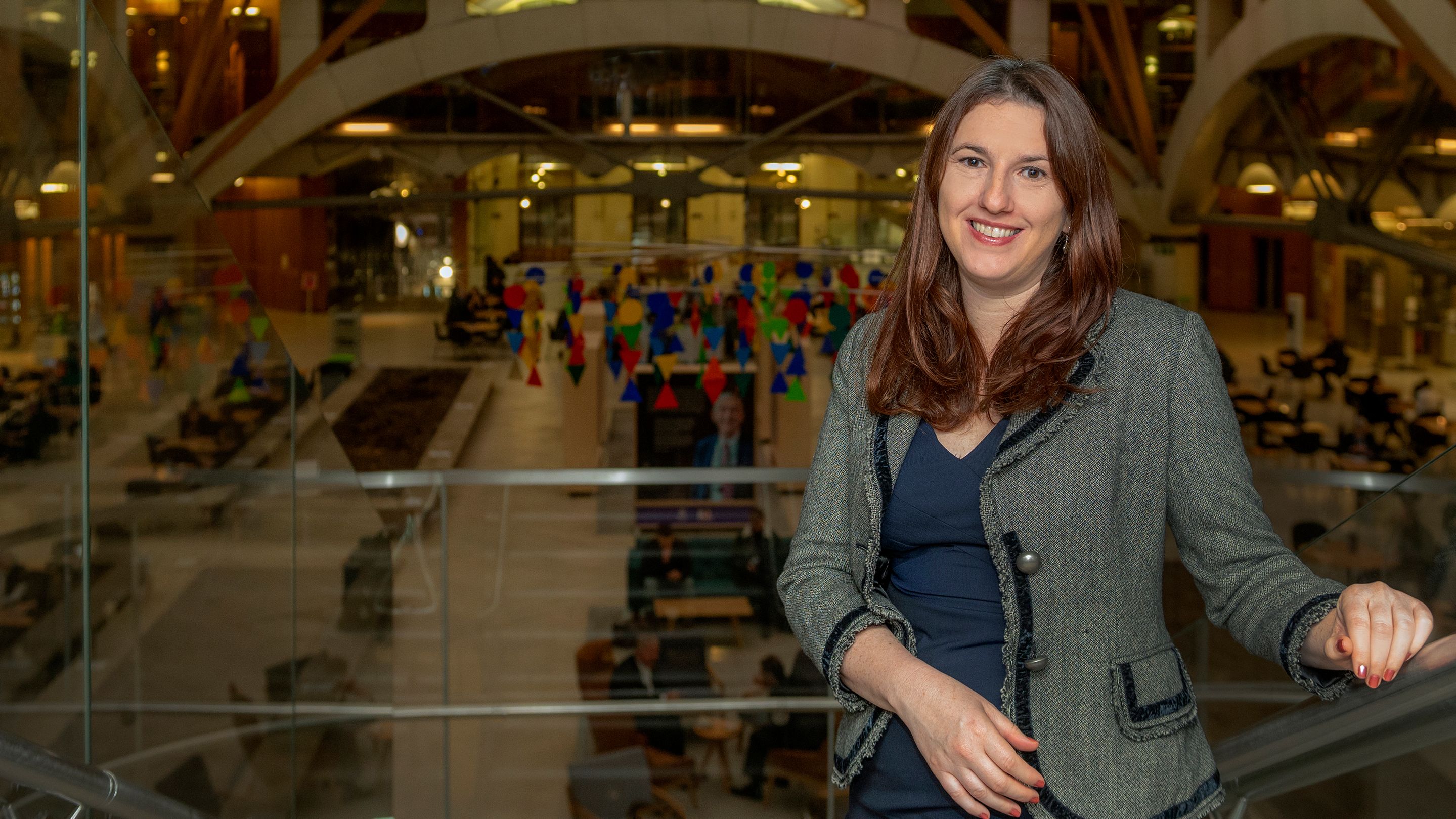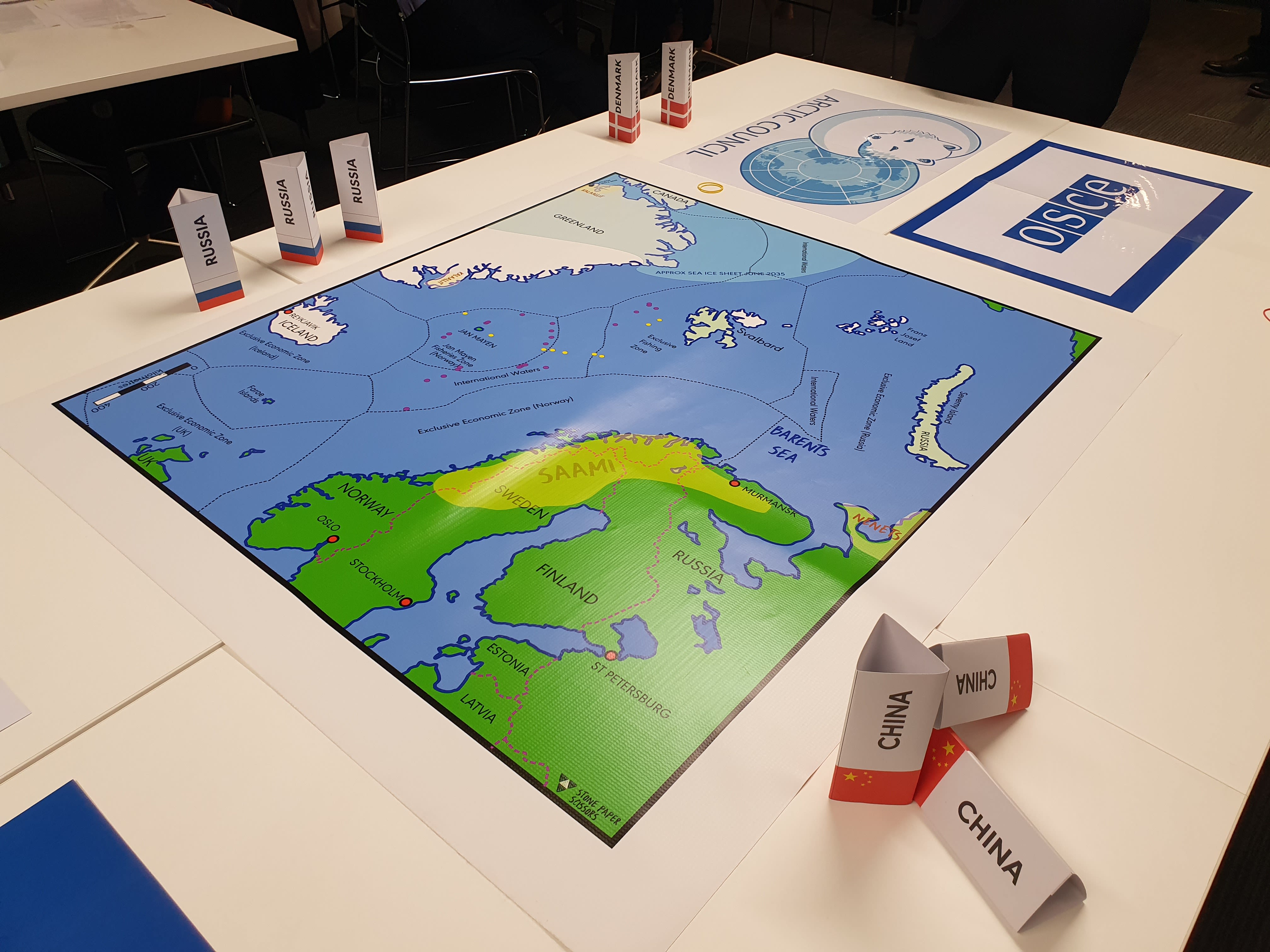Kristen Harkness: A year as Thematic Research Lead in Parliament
Hear from Thematic Research Lead for International Affairs and National Security Professor Kristen Harkness on her work bringing research into Parliament.

What is a Thematic Research Lead?
Thematic Research Leads (TRLs) are mid-career researchers embedded three days a week in Parliament.
The Thematic Research Lead network was started in 2023 to facilitate and enhance the use of research evidence and expertise in Parliament (both in the House of Commons and House of Lords) through effective knowledge exchange and collaboration. Each TRL leads on a specific policy area.
To achieve this, they conduct three primary activities:
- strategic support for the production and delivery of research evidence for Parliament, within a broad policy area
- activities to support the development of a research and innovation landscape that facilitates and encourages knowledge exchange between Parliament and the research community
- participation in a network of Thematic Research Leads to share intelligence and insights across policy areas.
There are currently three TRLs working in Parliament, covering the policy areas of international affairs and national security; climate and environment; and Parliament, public administration and constitution.
Meet Kristen
Professor Kristen Harkness is Senior Lecturer and Director of the Institute for the Study of War and Strategy, University of St Andrews.
"During my TRL experience I have greatly enjoyed working with wonderfully collaborative parliamentary teams on pressing global issues, trying to bring the best research evidence we have to Members so that they can scrutinize and improve government policy. At a time of spreading conflict and war, I have found it deeply meaningful to step into this role and try to make a difference."
Read on to hear from Kristen about her work and experiences as a TRL in Parliament.

Working as a Thematic Research Lead
One of the things I have enjoyed most about being a TRL is this remarkable opportunity, in the middle of my career, to broaden my horizons and indulge my intellectual curiosity. I have learned so much about Parliament, its traditions and inner workings. I have dived into learning about issues and policy areas far outside my narrower academic research expertise: from international treaties and institutions, to security threats in the High North, to economic security, to the impacts of conflict across Ukraine, Sudan, and Gaza. I have also benefited from training opportunities that have allowed me to build new skills, such as in programme evaluation and futures thinking.
I also really appreciate the wonderful environment of team collaboration in Parliament. I have provided support to both Commons and Lords committees, from rapid evidence panels on breaking global crises to multi-month inquiries on issues of enduring importance. I got to help design a public engagement activity on building appropriate human control into AI -based weaponry. I have led an initiative on developing interactive training for early career researchers on providing both written and oral evidence to inquiries, and have worked across both Parliament and the research councils to develop and refine knowledge exchange mechanisms.
My favourite project has probably been contributing to a pilot programme of policy simulations. Over several months, I took on the role of ‘game designer’ and led the content development of a policy simulation on environmental change, deep-sea mining, and geostrategic competition in a future Arctic. I got to work with my parliamentary team and a group of interdisciplinary academic experts to research and develop our scenario, underlying assumptions, country team goals and briefings, and other reference materials.
I learned so much about polar science, the Svalbard Treaty, the green energy transition, critical minerals, deep-sea mining technology, threats to undersea infrastructure, and the Arctic interests and policies of relevant states.
Policy simulation pilot programme
This project was a pilot in using simulations and their dynamic learning methodologies to immerse parliamentarians in Arctic issues, quickly expand their knowledge base, and stress test the UK's ability to promote its interests in a future regional crisis.
The policy simulation was set in the Arctic in 2035, when anticipated climactic changes may open seasonal navigable shipping routes and the green energy transition may skyrocket demand for deep-sea mining of rare earth elements. In this context, the simulation began with a Chinese company backed by Russian coast guard boats attempting to mine rare earth elements off the western coast of Svalbard, within Norway’s current Fisheries Protection Zone, bringing them into conflict with Western countries’ interests and testing the potential ambiguity of existing treaty and legal regimes.
I worked intensively for months with my parliamentary team based in the International Affairs Unit, a group of interdisciplinary academic experts, and a professional game designer to develop and deliver the simulation. I took on the role of ‘game designer’ and led on content development including the opening scenario, underlying assumptions, country team goals and briefings, non-played entity briefings, and reference cards on multilateral organizations, conducting a huge amount of research in the process.
On the day of the simulation itself, I gave the introductory scenario briefing to Members, conducted the between round updates and gave concluding remarks. I then took lead on drafting the final report, analysing the dynamics that emerged during the simulation and potential questions for future committee inquiries to scrutinize.
It was so rewarding to spend an afternoon with MPs, staff, and our experts immersed in Arctic issues and then think deeply about what we learned from the experience.

What next?
I am currently thinking deeply about my future research agenda. An advantage of spending time in the policy world is that you become more keenly aware of what research is needed; of what are the burning questions to answer. I’ve also gained insight and expertise on whole new topics as well as developed networks to facilitate interviews and other fieldwork. My interest has certainly been piqued by Arctic and High North security issues—not a research direction I would have even considered a year ago!
Find out more
Applications for the 2024-2026 TRLs have closed. Sign up to the Knowledge Exchange Unit weekly round-up to receive a wide range of engagement opportunities including fellowships, future Thematic Research Lead positions and other opportunities for experts and researchers such as contributing to Select Committees and POSTnotes.
This page was produced by the Knowledge Exchange Unit, part of the Parliamentary Office of Science and Technology. Find out more about us.